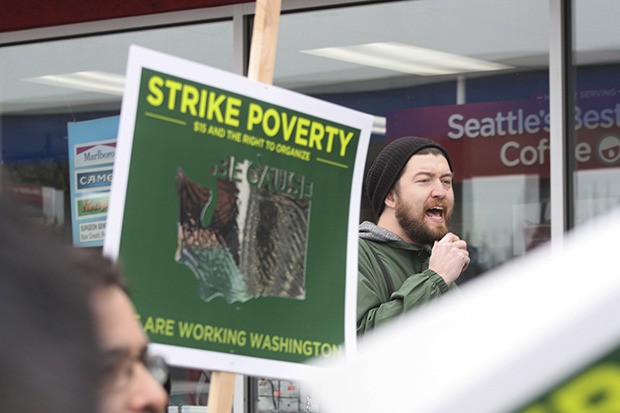Hundreds of sign-carrying protestors took to Kent’s streets Thursday, chanting for economic change and urging state leaders to raise the minimum hourly wage to $15.
Fast-food and other low-wage workers from the Kent area joined hundreds of other strikers in Bellevue, Aberdeen and Olympia – and thousands of others in more than 150 cities throughout the country – in the one-day rally, a show of solidarity for the cause of more livable wages.
The day of demonstrations was scheduled to culminate in a 4 p.m. strike-support rally at the State Capitol, just as members of the State House were scheduled to participate in a hearing on the minimum wage before the Labor & Workforce Development Committee.
Although home-care workers, airport service workers and service employees who work at federally-contracted businesses – all of whom are engaged in their own labor campaigns for higher wages and union representation – are rallying in support of fast-food workers in some cities, none are expected to walk off the job themselves.
In Kent, protestors began their rally in front of a McDonald’s on East Hill then marched along Southeast 240th Street. Stopping briefly at Popeyes Louisiana Chicken, much to management’s dismay, they circled the restaurant and left the parking lot.
The demonstration was peaceful but bold. Fast-food workers claim the state’s minimum wage of $9.32 is poverty pay.
“We would love to see wages rise up across the state,” said Sage Wilson, a spokesperson for Working Washington, which organized the rally. “One thing that we know is these (fast-food) companies can afford to pay more money. … These businesses are doing well. They’re profiting, they’re thriving in our communities, but the people who work there and the communities where they are operating don’t share in that wealth.”
Wilson said the fight for $15 is building momentum. The cities of Seattle and SeaTac have already agreed to raise the minimum hourly wage to $15. Other cities, he says, are calling for higher wages.
“What we learned in SeaTac and Seattle is when workers and supporters are out here telling the truth of what it’s really like to work at these places and earning poverty wages, it changes the conversation,” he said.
Fast-food companies have played down the protests, claiming the one-day strikes are ineffective. Industry officials often call the movement a union front.
McDonald’s and many fast-food companies have said they pay their workers competitive wages, and warn that a wage increase will hurt small and medium-size restaurant businesses.
The Economic Policy Institute, a national think tank, recently found the typical worker in the restaurant industry makes $10 an hour compared to $18 an hour typically earned in other industries. One in six restaurant workers, or 16.7 percent, lives below the official poverty line, compared to 6.3 percent of those working in other industries, the report said.
One report says fast-food workers are even poorer, earning an average of less than $8 an hour.
“Our economy needs a boost,” Wilson added. “More people with more money to spend is good for the economy.”
Talk to us
Please share your story tips by emailing editor@kentreporter.com.
To share your opinion for publication, submit a letter through our website https://www.kentreporter.com/submit-letter/. Include your name, address and daytime phone number. (We’ll only publish your name and hometown.) Please keep letters to 300 words or less.

